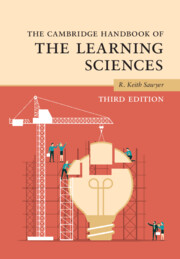Book contents
- The Cambridge Handbook of the Learning Sciences
- The Cambridge Handbook of the Learning Sciences
- Copyright page
- Contents
- Figures
- Tables
- Contributors
- Preface
- 1 An Introduction to the Learning Sciences
- Part I Foundations
- Part II Methodologies
- 9 Design-Based Research
- 10 Analyzing Collaboration
- 11 Microgenetic Methods
- 12 A Learning Sciences Perspective on the Design and Use of Assessment in Education
- 13 Learning Analytics and Educational Data Mining
- Part III Grounding Technology in the Learning Sciences
- Part IV Learning Together
- Part V Learning Disciplinary Knowledge
- Part VI Moving Learning Sciences Research into the Classroom
- Index
- References
11 - Microgenetic Methods
from Part II - Methodologies
Published online by Cambridge University Press: 14 March 2022
- The Cambridge Handbook of the Learning Sciences
- The Cambridge Handbook of the Learning Sciences
- Copyright page
- Contents
- Figures
- Tables
- Contributors
- Preface
- 1 An Introduction to the Learning Sciences
- Part I Foundations
- Part II Methodologies
- 9 Design-Based Research
- 10 Analyzing Collaboration
- 11 Microgenetic Methods
- 12 A Learning Sciences Perspective on the Design and Use of Assessment in Education
- 13 Learning Analytics and Educational Data Mining
- Part III Grounding Technology in the Learning Sciences
- Part IV Learning Together
- Part V Learning Disciplinary Knowledge
- Part VI Moving Learning Sciences Research into the Classroom
- Index
- References
Summary
Microgenetic methods are used to analyze moment-to-moment processes of learning, reasoning, and problem-solving. Microgenetic methods are useful when studying learning that does not occur in a straight line from lesser to greater understanding, but rather occurs through a learning trajectory that includes iterative and unpredictable paths and sometimes even setbacks or failure. Microgenetic methods are also useful in studying learning that is mediated by tools and artifacts in the learning environment, and what role those artifacts play in the developing learning trajectory. These methods are time-consuming and it’s not practical to conduct studies with large sample sizes or that occur over very long periods of time; rather, the focus is on developing a deep and thorough understanding of a specific learning environment and then to generalize those findings to a broader range of contexts. Microgenetic methods are particularly well-suited to five types of research questions: questions about the variability or stability of strategies; events that precipitate or initiate change; co-occurring events and processes; trajectories or paths of change; and the rate of change.
- Type
- Chapter
- Information
- The Cambridge Handbook of the Learning Sciences , pp. 217 - 237Publisher: Cambridge University PressPrint publication year: 2022
References
- 1
- Cited by

